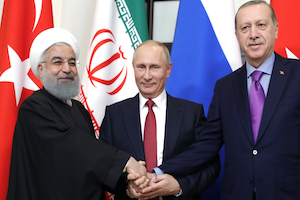After Ten Days that Shook Syria: Turkey's Dependence on Russia Reaffirmed
By Cengiz Çandar
November 5, 2019
Turkey’s intrusion into northeastern Syria will have far-reaching consequences for Turkey, the balance of power in Syria and in the Middle East. The Rojava invasion also leaves a durable imprint on international relations at a global scale. It has left the United States in a weaker position, while Russia has strengthened its grip on Syria. Turkey’s dependence on Russia has been reaffirmed. The Russo-Turkish partnership in Syria may not prove long-lived since Moscow and Ankara have different, indeed fundamentally irreconcilable political priorities. It is unlikely that Turkey, dependent on the acquiescence of Russia and with an ailing economy, will be able to establish a permanent military presence on Syrian territory.

The PKK and the PYD: Comrades in Arms, Rivals in Politics?
By Gareth H. Jenkins
April 20, 2016
Although the Kurdistan Workers’ Party (PKK) and the Democratic Union Party (PYD) are ideologically affiliated, they remain organizationally distinct. Even though it does not pose a direct security threat to Turkey, the PYD’s increasing consolidation of power in northern Syria arguably poses a challenge not only to Ankara but also to the PKK.
Is Turkey at War with the “Islamic State”?
By Halil Karaveli
January 25th, 2016, The Turkey Analyst
Terrorist attacks that target opponents of the Turkish regime and for which the “Islamic state” is held responsible are used to legitimize a “war against terrorism” that is a euphemism for Turkey’s new old war against the Kurdish movement. The forces behind the terrorism that has struck Turkey during the last six months will in all probability never be exposed. As a rule, political violence remains unresolved in Turkey, except when the Kurdish PKK is involved. Nonetheless, it is ultimately enough to know which forces that have historically been served by political violence. The instigators may have remained in the shadows, but it has always been clear that the winners have been the advocates of authoritarian rule.




